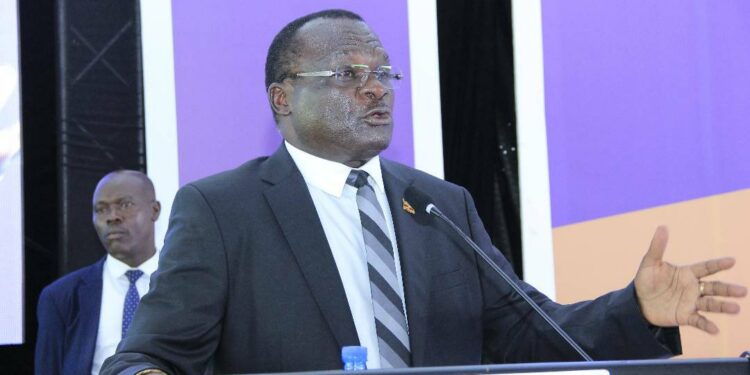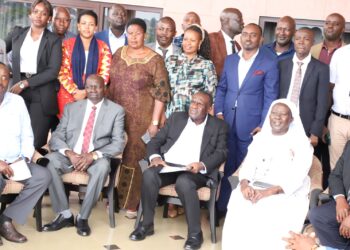Uganda’s Chief Justice, Alfonse Chigamoy Owiny-Dollo, announced a significant boost in public trust in the country’s judicial system during the Financial Year 2022/2023, marking an improvement compared to the previous two fiscal years.
Chief Justice Owiny-Dollo shared this revelation on Friday at High Court Kampala while unveiling the Annual Performance Report for the year 2022/2023. He attributed the growing trust to the enhanced case management practices across all levels of the judiciary.
The Chief Justice explicitly stated that the improvement in case disposition has led to a reduction in the average time taken for cases to be resolved, with the courts finalizing cases three weeks faster in FY 2022/23 compared to previous years.
He stated, “Thanks to this commendable performance, the percentage of court users expressing confidence in the judicial system has risen from 61 per cent to 71 per cent, as per a survey conducted by Avocats Sans Frontieres in 2023.”
According to the report, the Judiciary has achieved steady growth in the number of completed cases, reaching 266,323 cases in FY 2022/23, a notable increase from 205,967 cases in FY 2021/22 and 156,875 cases in FY 2020/21.
Case Management
As outlined in the Chief Justice’s report, the Judiciary resolved a total of 266,323 cases out of a caseload of 422,672, which comprised 128,652 cases carried over from FY 2021/22 and 294,020 freshly registered cases in FY 2022/23.
At different court levels:
The Supreme Court completed 62 cases out of 757. The Court of Appeal resolved 1,099 cases out of 9,297. High Courts achieved 62,702 completions out of 122,501 cases. Chief Magistrates handled 132,753 out of 197,077 cases.
Magistrate Grade I Courts saw 68,021 completions out of 90,584 cases. Magistrate Grade II Courts recorded 1,686 completions out of 2,456 cases.
In total, out of the 422,672 cases in FY 2022/23, 266,323 were resolved, leaving 156,349 cases pending.
The report highlighted that during the reporting period, Magistrates Grade One achieved the highest disposal rate, concluding 134,583 cases, followed by Chief Magistrates with 35,108 cases. This achievement can be attributed to the higher staffing levels, with Magistrates Grade I having 292 staff, compared to Chief Magistrates (77) and Magistrates Grade II (22) as of June 30, 2023. The increased staffing levels at various court tiers resulted in enhanced productivity, especially at the High Court and Magistrate court levels.
Case Disposition Based on Case Profile
The report indicated that criminal cases constituted the majority of registered cases and also had the highest completion rates. The Chief Justice attributed the increase in criminal cases to population growth and urbanization, leading to employment challenges and a higher crime rate. Conversely, international crimes had the lowest registration and completion rates.
Meanwhile, in the current Financial Year, the Judiciary registered:
206,244 criminal cases, of which 139,768 were completed. 90,638 civil cases, with 52,017 completions. 62,012 land cases, resulting in 30,687 completions. 26,385 commercial cases, with 18,946 solved. 36,776 family cases, and 24,550 completions. 474 anti-corruption cases, of which 277 were resolved. 143 international crime cases, with 78 completions.
Case Management Methods
The Chief Justice credited various mechanisms for the improved case disposition:
Plea Bargaining Programme: The program facilitated the completion of 2,857 cases at the High Court level, 1,160 cases through day-to-day hearings, and 1,697 cases via Plea Bargaining Camps. An additional 2,389 cases were finalized through Plea Bargaining Camps in various Magisterial Areas, achieving an 88.12 per cent clearance rate with an average lead time of less than one day.
Small Claims Procedure (SCP): Currently, this method is in use in 178 courts across the country. The expansion of SCP courts and the growing number of cases registered reflect a user-friendly and demand-driven initiative. A total of 22,092 cases were completed through SCP, recovering claims totalling Shs16.4 billion, compared to Shs11.1 billion realized in FY 2020/21.
Mediation: A total of 1,250 cases were mediated to a conclusion out of 2,210 cases enrolled under the mediation scheme.
Special Sessions on Gender-Based Violence (GBV) Related Cases: With support from UNFPA, the Judiciary organized GBV criminal sessions at various locations, recording a clearance rate of 88.86 per cent.
Additionally, the Judiciary transitioned from a criminal session system to daily hearings, resulting in quicker disposal of cases. The reduction in the average lead time was significant, from 863 days prior to the start of the Pilot Project to 613 days in the last 7 months of FY 2022/23 under the Pilot Project. This change was particularly pronounced in the Criminal Division at the High Court level.
Do you have a story in your community or an opinion to share with us: Email us at editorial@watchdoguganda.com













